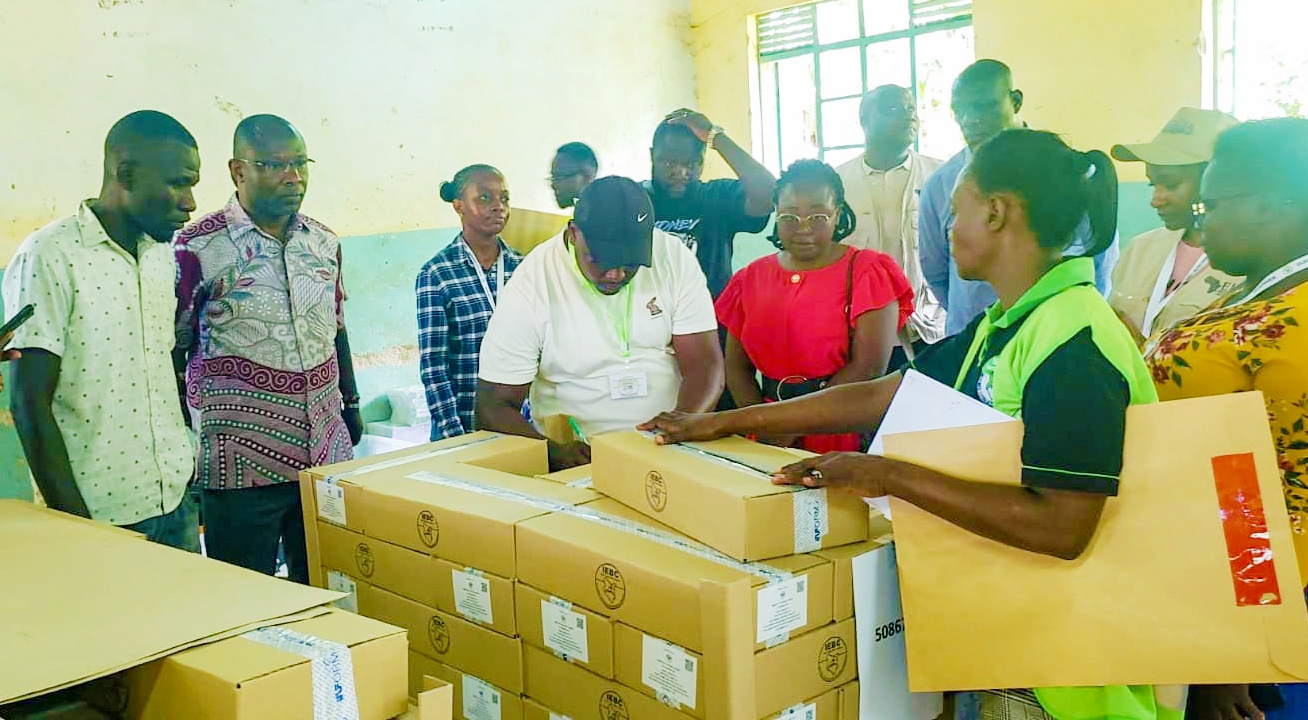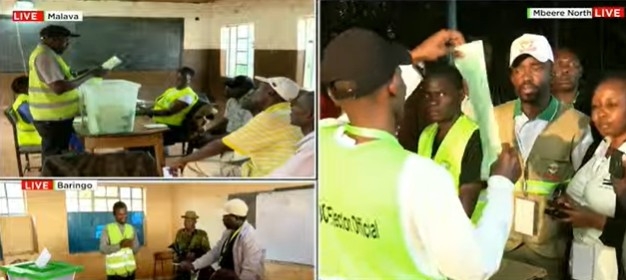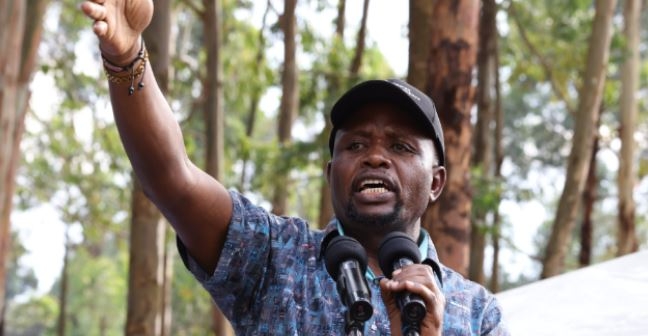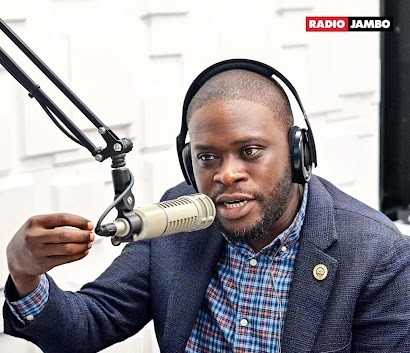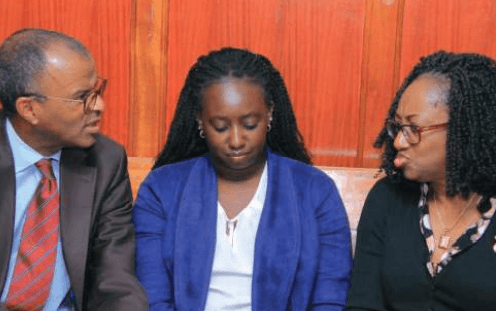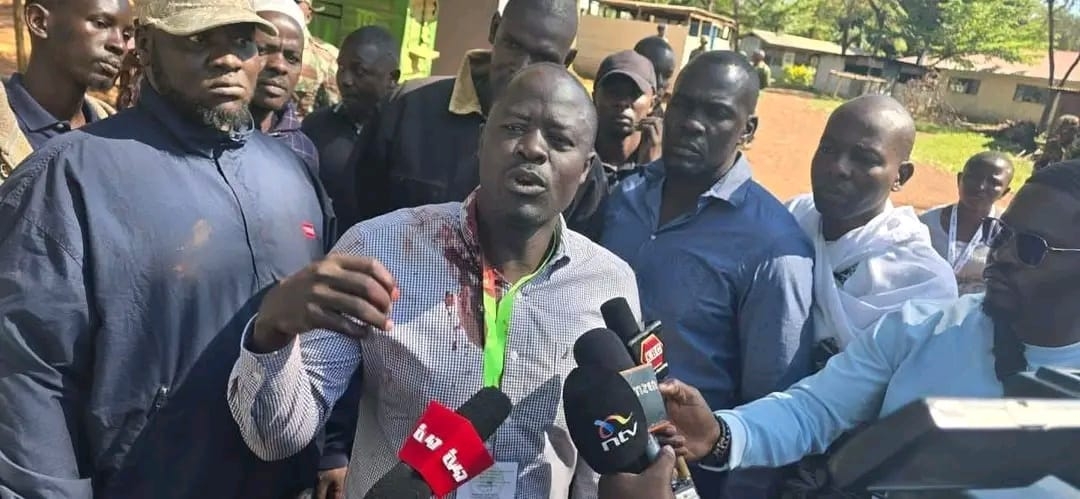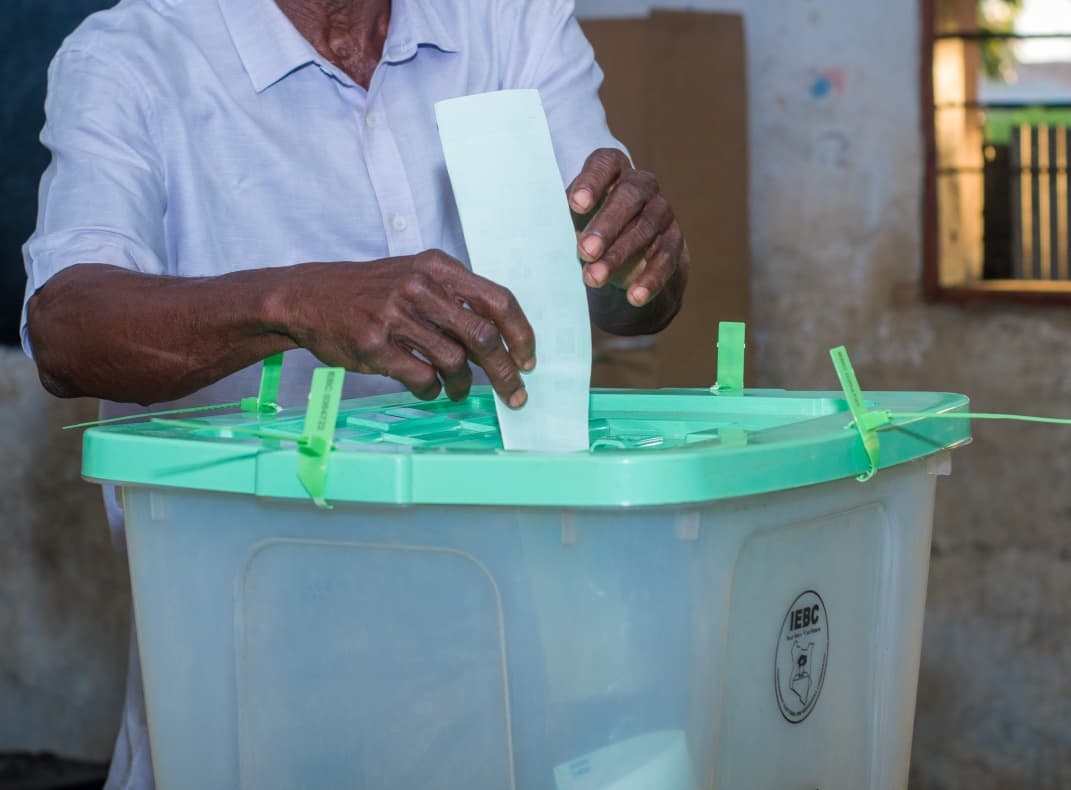As the number of those infected by the coronavirus disease continues to rise, concerned Kenyans are reaching out to all manner of quick fix solutions which they hope will protect them from catching the virus.
On a rainy Monday morning at about 1 pm, I sit at a café in Nairobi's Central Business District. As I sip my coffee, I glance at the door in time to see Nahashon Kamau* walk in. I recognize him from his Facebook profile picture. We are meeting for business. He wants to sell me the iProtect 24/7, a chain that he claims can prevent the wearer from getting the coronavirus through a 'force field' emitted through the substance stored in the pendant. Yes, you read that right. A force field. But let me go back to the beginning.
As part of my daily Whatsapp usage, I receive several dozen messages from any number of groups but when I saw one claiming to provide protection from COVID-19, I stopped and paid attention.
Not only did the product claim to protect against COVID-19 but also Tuberculosis, and “any airborne disease”. Though the price of the item was not stated, the message was accompanied by a number where you could send your payment via MPESA.
Curious, I sent a private message to the person selling the product - Nahashon. He was quick to tell me that he had only a few pieces left. Out of the ten he had bought, he only had 2 remaining, I should buy one now before they ran out. “But how much is it?” I asked.
He finally revealed that the packet plus the chain were going for a whopping Ksh 8,500. I swallowed my disbelief and convinced him that before I could commit to parting with that amount of money, I would like to meet and view the product. He agreed.
Nahashon did not have an umbrella and had kept me waiting that morning for almost 2 hours but he was very apologetic when he arrived and even offered to pay for my Ksh 200 cup of coffee.
He seemed relieved when l declined. Immediately after he started on his sales pitch.
He assured me that if I wore the pendant around my neck, I would be protected by a 2-meter “green zone” where no bacteria or viruses would be able to survive.
I immediately knew that this claim as well as all the others he makes about the pendant and its ‘miraculous’ powers are false, of course. Scientists have already established that the coronavirus spreads through close contact, via tiny droplets emitted when people talk, cough, and sneeze. The virus is also airborne and can travel distances of over six feet. Preventing COVID-19’s spread requires wearing a mask, washing hands, maintaining physical distancing, and disinfecting surfaces regularly.
But Nahashon was adamant. After a long explanation using a mixture of real and fake science, he says, “We have been trained, we are always trained on how the body works and how these products work to heal it by nutritionists through videos.”
He further claimed that most of his clients were nurses and doctors working in hospitals all over the country but was reluctant to give any names.
“If I wanted to sell these products to a patient, I consult Phillipine doctors for the dosage. So if you have any condition, I connect you with these doctors who have studied nutrition,” he says. He had no answer when I asked him why a patient has to consult a nutritionist or doctor in the Philippines instead of a local health professional before taking up the pendant.
He claimed the pendant and other quasi medical products he sells have ‘cured’ cancer patients. But he offered no evidence to prove this.
What is the origin of this product?
From the conversation, it was clear that Nahashon and others like him have been preying on desperate but gullible Kenyans seeking guarantees against catching the coronavirus whose vaccine is yet to be found.
Nahashon spouted the claims that are to be found on a Facebook page dedicated to the product which claims that the pendant “emits invisible fumes and it will create a 2-meter ‘Force Field’ that protects the wearer against bacteria and can last for up to 60 days.”
The promotional video on the page, which has been shared 294 times, dates back to 2016. In grainy quality, it depicts a man demonstrating the use of the product.
He cuts an orange and puts the two pieces into 2 different zip lock bags. In one of the bags, he places a tablet of iProtect 24/7. 11 days later, he opens both bags. The orange without the iProtect 24/7 tablet is green and mouldy while the one that had the tablet looks freshly cut. “There you have it. The proof of how iProtect keeps your food virus-free,” he says as the video fades to black.
They claim the product, whose main ingredient is chlorine dioxide, was invented using Japanese technology and went through 30 years of “heavy laboratory and clinical research.”
To be clear, the pendant, a cheap chain coated with a layer of paint, has no healing or preventive properties. If indeed the sachet it comes with includes chlorine dioxide, it too cannot prevent one from getting infected by the virus. It is in fact a powerful bleaching agent and can have potentially fatal effects on the human body.
“Chloride dioxide is used to sterilise medical equipment and most pathogens are susceptible to its effects,” says Dr. Okinyi Tabu who has been treating COVID-19 patients in Nairobi. “However this is at a concentration that's high. High enough that it shouldn't be inhaled by humans which will inevitably happen if one wears it around the neck. it will cause nasal and throat irritation. For individuals like asthmatics, this can trigger an attack.”
Though the sachet does not contain any ingredient information, it contains a warning not to ingest the tablet, that it is made in the USA and a section stating that the product is “Exclusively Distributed Worldwide Online by ALLIANCE IN MOTION GLOBAL INC.”
The AIM Global connection
Alan Maina* joined Alliance In Motion Global (AIM Global) in late 2016. At the time he was 19 years old.
“Me and a group of friends were recruited by a mutual friend who marketed it to us as a business opportunity. We were invited for an introductory presentation in town,” says Alan.
For about 2 hours, they and about 50 other youths were enticed by well-dressed members of the group with promises of big cheques and lavish lives. All they had to do was join the company with a deposit of Ksh. 23,000. Though they were shown a long list of medicinal and herbal products that they could sell and gain a commission from, they were told that real money comes from recruiting people.
Hundreds of youth are inducted into AIM Global in a similar way every year since the company started operation in Kenya in 2015. It follows a multi-level marketing model which relies on recruitment as the source of income; you gain a commission for each person you recruit under you and from the people they recruit as well. The more people you have under you, the better.
The company was started in The Philippines in 2006 by Dr. Eduardo Cabantog, who brands himself as “the visionary president, loving husband, a good father and a servant leader” on his Facebook profile.
According to Nahashon, Dr. Cabantog is a doctor by profession, who allegedly graduated from Harvard University where he studied medicine and then nutrition. The Harvard Medical School registrar’s office located no records indicating that a person by that name graduated from their institution.
The company has expanded to several countries and according to eyewitness accounts, came to Kenya via a Nigerian member whose expensive cars and vacations to destinations all over the globe are projected on screens to entice youths and other unemployed Kenyans to join.
The trend of Multi-Level-Marketing (MLM) initially gained steam with American housewives as the target market. Also known as network marketing, they are defined as businesses that use individuals to sell products to the public, rather than setting up a physical shop or availing stock in supermarkets. However, most have entered the territory of being pyramid schemes which are businesses that rely on recruitment as their main source of income generation and often claim to be MLMs when called out.
This model is now thriving all over the world with several companies cropping up to take a share of the cake and according to Alan, AIM Global is one of them. On the surface, they claim to be “an exclusive distributor of premium nutritional supplements” and aim at “creating opportunistic avenues and prosperity through distributor empowerment.”
“At that time it seemed life-changing because how it was presented was that it was easy money to be made. I wasn’t well educated to know the effort that was required to sustain such a business model,” says Alan.
In Kenya, AIM Global is registered with the Registrar of Companies. Three Filipinos are listed as Directors and Shareholders, including the CEO Dr. Cabantog and one Kenyan who has neither any shares in the company nor a directorial position.
However, like many other testimonies about the company, Alan says only those who joined early on make any significant amounts of money. Those who joined later on like him work hard for little gain.
Former members of the group have claimed huge losses, including a Kenya Defence Forces officer who is reported as of June 2020 to be pursuing Ksh. 317,000 from two of the agency’s members for allegedly defrauding him.
The strongest move made in the country to put an end to such schemes was in 2012 when former Ikolomani MP Boni Khalwale tabled a Bill in parliament titled ‘The Prohibition of Pyramid Schemes Bill, 2012.’ It included a clause on compensation for victims and a fine not exceeding Ksh.10 million or imprisonment for a term not exceeding 10 years, or both for those who knowingly promote a pyramid scheme. Unfortunately, the Bill was not discussed in parliament as the National Assembly was dissolved due to elections and no other MP took up the initiative.
“Generally, pyramid schemes take advantage of weak Kenyan laws to con innocent Kenyans. The current lacuna in law makes it very difficult for the relevant government authorities to really catch up with fraudsters despite hundreds of Kenyans losing significant amounts of money to such schemes almost on a daily basis,” says Dr. Johanna Githongo, the Dean of the Law school at the University of Embu.
Alan shares how AIM Global uses all sorts of marketing tactics to recruit members including creating several Facebook pages, blogs and websites. They even went as far as posting fake job opportunities on job seeking sites then inviting the job seekers who reached out to them to AIM Global recruitment meetings.
Alan admits to recruiting 35 other people, mostly young people like himself who were broke and hungry for success. Using the same tactics that entrapped him, he lured them to the recruitment meetings and signed them up one by one, including his own friends.
Maureen Odongo* almost fell for the trap. In early 2018, Alan approached her with the same strategy used on him; a “business proposal”. “That’s the term he used,” she says. “And I was intrigued because we were friends and I’d seen him buy expensive tech gadgets so I really wanted to know how he was making the money to afford them,” she says.
After attending the recruitment session she had several questions. Something was off. “They even wanted us to sell our laptops to get Sh23,000 to join. And they were getting so angry when we would ask questions,” she said.
After consulting with her mother and some friends, she was introduced to the concept of pyramid schemes which helped her make up her mind. After declining Alan’s offer to join he got angry with her and cut off all ties.
Before we met and throughout his sales pitch, Nahashon used the same aggressive tactics witnessed by Alan and Maureen to get me to join the company and become a distributor.
He gave me constant reassurances that I would earn cash quick once I joined.
Alan and his friends left the company in late 2018 to pursue a legitimate business venture when they realized they were “embracing poverty for someone else’s gain” as he puts it.
“I had managed to recoup the initial 23,000 I had used to gain membership plus another 23,000 from another account I created but unfortunately for the other individuals I had convinced to join, most lost their money,” he says.
Upon their exit, they were bad mouthed and told they would never be successful by the group. Others even tried approaching them to rejoin, but they were done.
Two years down the line the friendship between Alan and Maureen is on the mend. “He’s different. I think he’s changed,” says Maureen.
Despite the fact that the company focuses on recruitment as the main source of income, their fake products are still not to be ignored. Alan used to wear the iProtect 24/7 necklace while he was with the agency. It comes with the packet of products each member gets after paying the Ksh23,000. Several members sported theirs on a daily basis.
“The product description says the circular capsule houses some chlorine compound that releases free-ions that “protect” the user from bacteria and viruses in their immediate vicinity. But in all honesty it's a gold plated chain that doesn’t do anything,” says Alan.
When 2020 rolled around, the marketing strategy to sell the product was revamped to include alleged protection against coronavirus.
The agency has a whole catalogue of bizzare products that make great claims on their healing properties that are sold under the guise of certification from regulatory bodies, which is misleading.
No facts
iProtect 24/7 is not the only product being touted as a ‘cure’ or preventive measure for COVID-19. As of October 30, the US Federal Trade Commission (FTC) and the Food and Drug Administration (FDA) had issued warning letters to 123 companies touting these fake products. Everything from silver to essential oils, homeopathic products, ozone therapy and even particular vitamins have been sold to fear-driven consumers as miracle cures.
Claims have been made by, among others, US President Donald Trump, that hydroxychloroquine and chloroquine, which are usually used to treat malaria, is also a possible cure for the coronavirus. In early April, Trump touted it as “one of the biggest game-changers” and this led to frenzied buying of the medicine.
In a video that went viral, a woman held a press conference outside the US Supreme court to convince people that hydroxychloroquine is the answer the world has been waiting for.
“This virus has a cure, it’s called hydroxychloroquine,” the woman claimed. “You don’t need masks, there is a cure.”
At the time, the Ministry of Health through Dr. Patrick Amoth, the Acting Director General for Public Health dismissed these claims as unscientific and baseless. “The video was based on individual sentiments without any scientific evidence. WHO has set out clear guidelines with regards to any treatment of the disease,” he said.
As of June 2020, the WHO cautions against the use of hydroxychloroquine to treat COVID-19 outside hospitals or clinical trials due to risk of heart problems and as of October 2020, there are no FDA-approved products to prevent COVID-19.
AIM Global and all their products, including the iProtect 24/7, claim certification from the Kenya Bureau of Standards (KEBS) but none of their products are listed as approved and active by these regulatory organizations. Furthermore the logo on the pamphlets used to sell products is not the KEBS standardization mark.
When I confronted Nahashon about his claims about the false information he gave me, he asked me to confirm with the AIM Global Kenya office. “Kindly let me know how you got to this conclusion that AIM Global products are not true. I don't want to sell company products if what you say is true,” he said.
The Kenya Head office of AIM Global declined to comment on the matter.
When contacted, Dr. Monyuruku, a representative of the Kenya Pharmacy and Poisons Board said that inspectors would be sent to the AIM Global offices to investigate the matter. “Any person claiming to sell anything that treats, prevents or diagnoses a disease must provide scientific evidence to confirm their claims. They should be reported to us. Such culprits are dealt with according to the provisions of Cap 244 of the laws of Kenya,” he said.
Cap 244 is an act of parliament that created the Pharmacy and Poisons Board in order to regulate the sale of drugs and medicines in the country. It describes a medicinal substance as “any medicine, substance, product or article that is claimed to be useful for any of the following purposes; a) treating, preventing or alleviating disease or symptoms of disease; b) diagnosing disease or ascertaining the existence, degree or extent of a psychological condition; c) preventing or interfering with the normal operation of a physiological function in human beings or animals, whether permanently or temporarily.”
The World Health Organization (WHO) along with other UN organizations released a joint statement in September warning against the misinformation on COVID-19 spreading as fast as the virus, a phenomena they termed an ‘infodemic’.
The combination of the overabundance of information along with bad actors in society leaves some in society vulnerable to manipulation. It is advisable to always verify the messages you receive through Whatsapp and other social media platforms by double checking with the WHO, the Ministry of Health and other official and credible sources. Before buying into any remedies, consult with your doctor.
Some tips offered by the FDA to identify false and misleading claims include being suspicious of products that claim to treat a wide range of diseases, relying on scientific facts rather than personal testimonials, and to keep in mind that if it seems too good to be true, it probably is.
Though most patients are asymptomatic, Dr. Okinyi advises sticking to the recommended measures given by the WHO. “Prevention methods are social distancing, washing hands and wearing masks,” he says.
What this case demonstrates is that stronger enforcement of non-essential medicines is needed in the country. In another circumstance, I could have left the cafe that day in August with the iProtect 24/7 necklace around my neck and Ksh. 8500 less in my bank account. But whether or not the product contains chlorine dioxide or another substance, the Pharmacy and Poisons Act is meaningless if products based on unconfirmed or outrightly false science can be sold as legitimate remedies. And as COVID-19 continues its extended stay in Kenya and all over the world, more and more people are at risk of falling for these scams.
This report was supported by the Africa Women Journalism Project (AWJP) in partnership with the International Center for Journalists (ICFJ).



